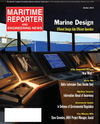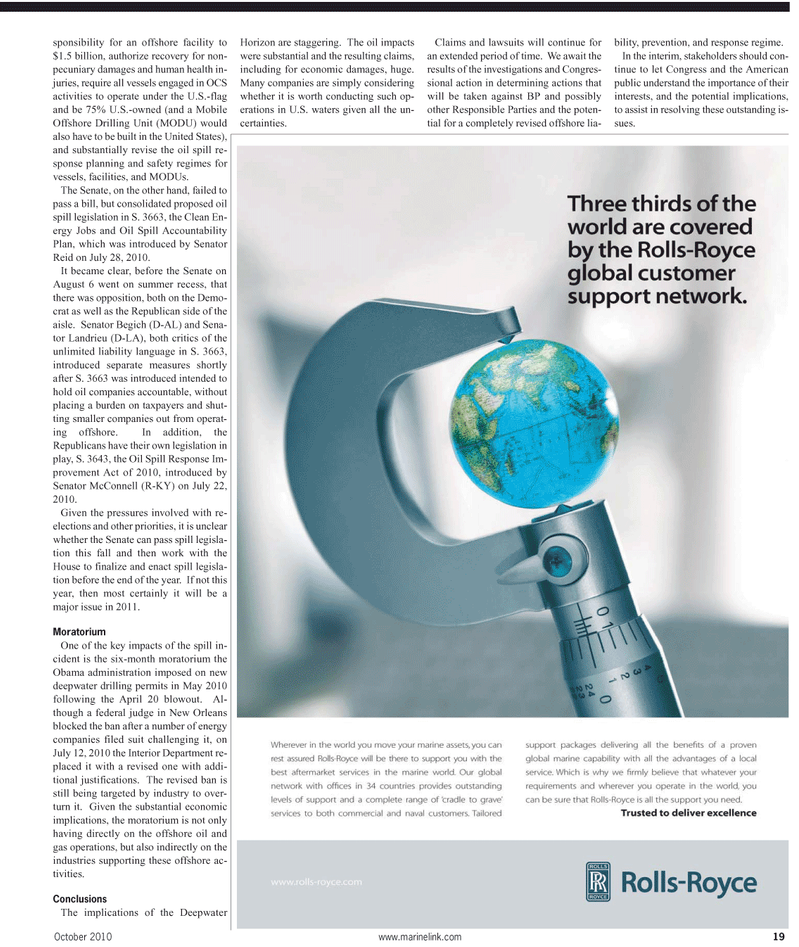
Page 19: of Maritime Reporter Magazine (February 2, 2010)
Read this page in Pdf, Flash or Html5 edition of February 2, 2010 Maritime Reporter Magazine
October 2010 www.marinelink.com 19 sponsibility for an offshore facility to $1.5 billion, authorize recovery for non- pecuniary damages and human health in- juries, require all vessels engaged in OCS activities to operate under the U.S.-flag and be 75% U.S.-owned (and a Mobile
Offshore Drilling Unit (MODU) would also have to be built in the United States), and substantially revise the oil spill re- sponse planning and safety regimes for vessels, facilities, and MODUs.
The Senate, on the other hand, failed to pass a bill, but consolidated proposed oil spill legislation in S. 3663, the Clean En- ergy Jobs and Oil Spill Accountability
Plan, which was introduced by Senator
Reid on July 28, 2010.
It became clear, before the Senate on
August 6 went on summer recess, that there was opposition, both on the Demo- crat as well as the Republican side of the aisle. Senator Begich (D-AL) and Sena- tor Landrieu (D-LA), both critics of the unlimited liability language in S. 3663, introduced separate measures shortly after S. 3663 was introduced intended to hold oil companies accountable, without placing a burden on taxpayers and shut- ting smaller companies out from operat- ing offshore. In addition, the
Republicans have their own legislation in play, S. 3643, the Oil Spill Response Im- provement Act of 2010, introduced by
Senator McConnell (R-KY) on July 22, 2010.
Given the pressures involved with re- elections and other priorities, it is unclear whether the Senate can pass spill legisla- tion this fall and then work with the
House to finalize and enact spill legisla- tion before the end of the year. If not this year, then most certainly it will be a major issue in 2011.
Moratorium
One of the key impacts of the spill in- cident is the six-month moratorium the
Obama administration imposed on new deepwater drilling permits in May 2010 following the April 20 blowout. Al- though a federal judge in New Orleans blocked the ban after a number of energy companies filed suit challenging it, on
July 12, 2010 the Interior Department re- placed it with a revised one with addi- tional justifications. The revised ban is still being targeted by industry to over- turn it. Given the substantial economic implications, the moratorium is not only having directly on the offshore oil and gas operations, but also indirectly on the industries supporting these offshore ac- tivities.
Conclusions
The implications of the Deepwater
Horizon are staggering. The oil impacts were substantial and the resulting claims, including for economic damages, huge.
Many companies are simply considering whether it is worth conducting such op- erations in U.S. waters given all the un- certainties.
Claims and lawsuits will continue for an extended period of time. We await the results of the investigations and Congres- sional action in determining actions that will be taken against BP and possibly other Responsible Parties and the poten- tial for a completely revised offshore lia- bility, prevention, and response regime.
In the interim, stakeholders should con- tinue to let Congress and the American public understand the importance of their interests, and the potential implications, to assist in resolving these outstanding is- sues.

 18
18

 20
20
